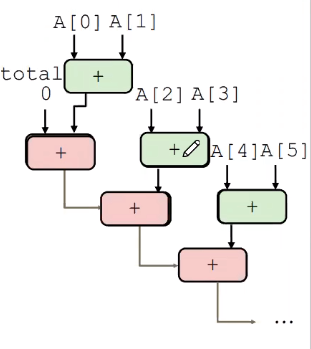Status: Tags: #cards/cmpt295/compilers Links: Coding MOC
Code Optimization
Principles
gcc has different forms of optimization: -Og -O1 -O2
Code optimization helps with:
Reduction in Strength
? Turn existing code into a less demanding operation
Example
- y = x / 2.0 => y = x * 0.5
- Division is more expensive than multiplication
- Easy to do if constant
Remove unecessary function call
? For a function that adds 1,2,…,7:
- Og reduces bloat
- O1 just calculates and automatically includes it
Code Motion (-O1)
?
- Moving code
- Instead of calculating N*i in a loop multiple times, calculate it beforehand
Limitations
- Optimization blockers
- Function calls, can’t tell if there is side effect
- Memory aliasing
- May not be able to determine when pointers are aliased
Solutions
- Reduction in strength
- Code and function calls motion
- Memory references in loops: use local var instead
- Branching minimization
- Try to not have to use if statements
- Inline subsittution
- Replace func calls with func implementation
For Instruction-level parallelism
- Be careful of using too many registers
Loop unrolling (kxc)
?
- Restructure code to allow multiple arith calculations in parallel due to multiple units, leading in less loop iterations
- ex) Increment for loop by 2 each time, add A[i] and A[i+1] to total
- Denoted by k being how much you unrolled
Re-associating (denoted as a) ?
-

- Each horizontal level is a clock cycle
- total = total + (A[i] + A[i+1])
- Slowly converges to 1 clock cycle per iteration
Accumulating ?
- denoted as c where b is how many accumulators you are using in your code
References:
Created:: 2022-04-07 01:01